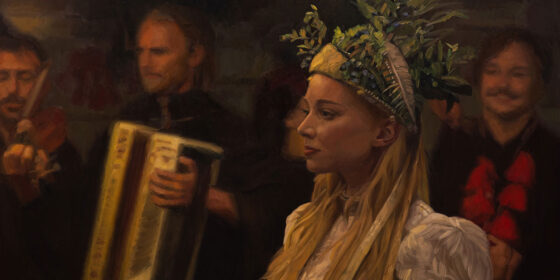TIFF 2023 | The Peasants (DK Welchman & Hugh Welchman, Poland/Serbia/Lithuania) — Special Presentations

By Madeleine Wall
The young and beautiful Jagna (Kamila Urzedowska) is ripe for marriage, and every man in the village has eyes for her. Unfortunately, Jagna is only interested in the married Antek (Robert Gulaczyk), and their star-crossed romance is the kindling to Jagna’s demise. The second hand painted feature animated film by DK and Hugh Welchman’s after 2017’s Loving Vincent, The Peasants is composed of over 40,000 individual oil paintings, a technical feat involving the work of hundreds of animators across eastern Europe. This adaptation of Władysław Reymont’s novel of the same name is a rural epic, spending a year in the 19th century Polish village of Lipce.
Divided by the seasons, each defined by different stages of the harvest that the villagers lives’ are centered on, the Welchmans’ film follows families feuding over farmland and inheritance, their shifting roles in an isolated community and the breaks that are needed for meaningful change. Jagna’s mother marries her off to the richest farmer in town, the recently widowed Boryna (Mirosław Baka), who also happens to be Antek’s father. Before this, Boryna and Antek were at odds over farmland, for Boryna’s children desperately want the financial independence which he refuses to give them. Jagna and Antek cannot keep apart for long, and their affair is quickly the talk of the town, escalating until Jagna is targeted as a scapegoat. The fight over farmland and Jagna’s fight for autonomy are easily paralleled, with everyone trapped in the cycle of seasons and yearning
The Peasants straddles the present and the past, with a keen eye to the details of rural Polish traditions, all scored by Lukasz L.U.C. Rostkowski’s hybrid of traditional folk music and hip-hop beats. One wishes, however, that the filmmakers had taken more influence from 19th century oil framing when it comes to lighting and blocking, for the animation methods, which are, in terms of skill and labour, quite remarkable, risk being little more than a gimmick on screen. Still, the tactile quality of the brush strokes across faces gives the film its Janus-faced quality, and ensures that these old stories retain their immediacy.
Madeleine Wall

